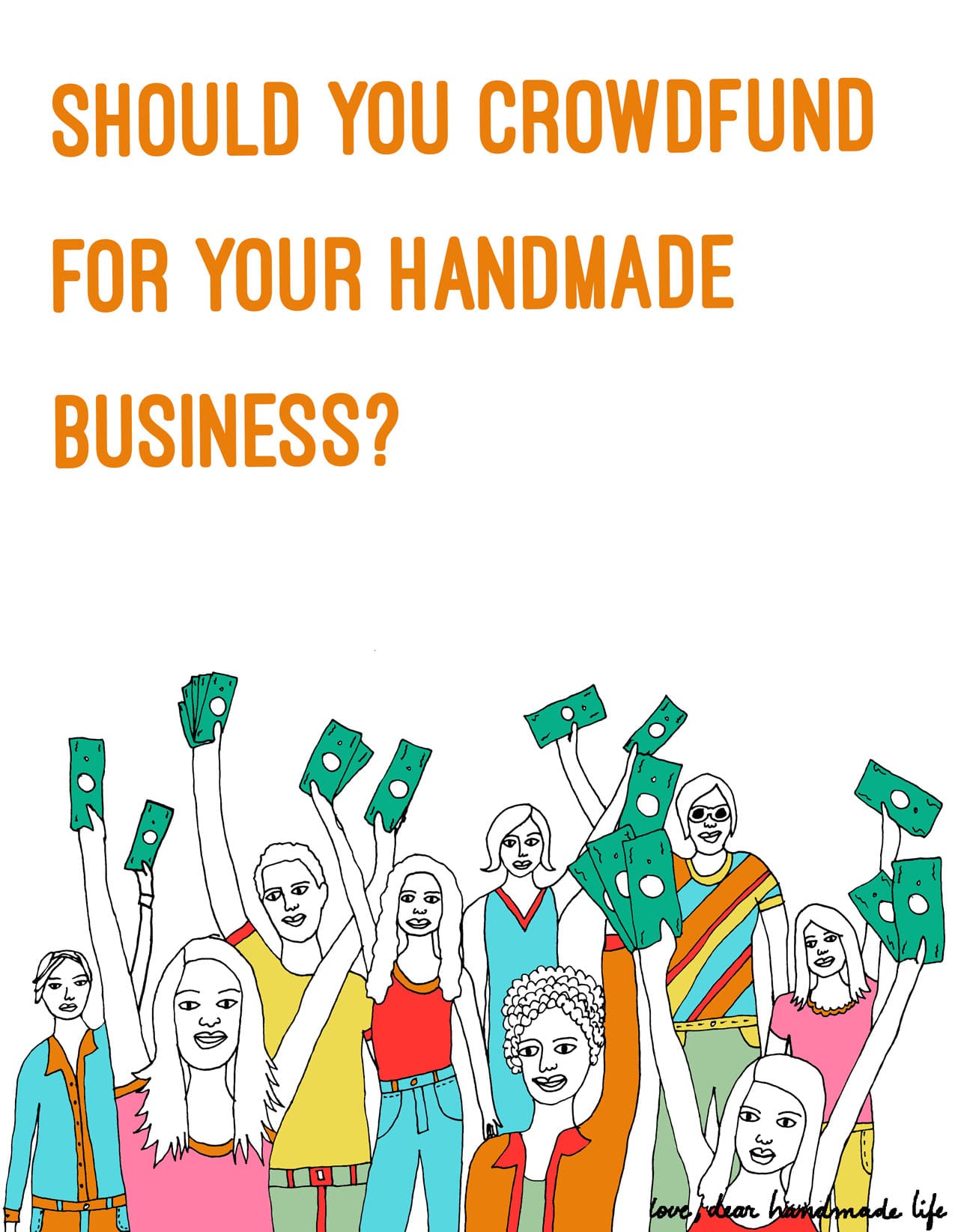Should you crowdfund for your handmade business?
 As independent creatives, most of us had the opportunity to support, or even run, a crowdfunding campaign for a creative project. Mustering up support from the community for our ambitious, creative projects is a big part of how creative projects happen at all in this post-recession age. Every day it seems like a new crowdfunding platform launches and the idea itself has passed from novelty to mainstream. The major television network A & E has even gotten involved and collaborated with the crowdfunding platform RocketHub on the show “Project Startup.”
As independent creatives, most of us had the opportunity to support, or even run, a crowdfunding campaign for a creative project. Mustering up support from the community for our ambitious, creative projects is a big part of how creative projects happen at all in this post-recession age. Every day it seems like a new crowdfunding platform launches and the idea itself has passed from novelty to mainstream. The major television network A & E has even gotten involved and collaborated with the crowdfunding platform RocketHub on the show “Project Startup.”
As a handmade business owner you may have watched these campaigns and asked, “Does crowdfunding make sense for me?” There have been some incredible crowd funding success stories, like musician Amanda Palmer’s Kickstarter campaign that raised over a million dollars, which she discussed in a wildly popular TED talk. Crowdfunding’s popularlity has also generated backlash and parodies, such as Zach Danger Brown’s Kickstarter campaign to make potato salad, which raised over $50,000. This makes some of us wonder if crowdfunding jumped the shark for serious creatives?
I ran a crowdfunding campaign last year to support the book tour for my book Grow: How to Take Your Do It Yourself Project and Passion to the Next Level and Quit Your Job. I’ve also worked helping artists raise money for ambitious projects of their own. I think that well-thought-out crowdfunding campaigns will endure as a method to raise funds for creative projects. However, crowdfunding is not a fit for every project that needs funding. Before you jump into running a campaign I invite you to consider whether crowdfunding will benefit your project.
If you are considering launching a crowdfunding campaign, think about:
What motivates you to organize this campaign and more importantly, the project that it is supporting? Do you want to launch this campaign to bring community members into your creative and professional projects? Do you want to raise awareness about your work? Crowdfunding is a very public process and that’s a good thing because it’s a chance to generate excitement, hype and public attention for your project, as well as anticipation (as long as you fulfill your rewards in a timely nature).
What purpose will the money you raise serve?
Will raising money help you as a creative and a business owner to take the next step in your career? Will community support for your project add a value that goes beyond just the financial? Are you prepared to be transparent about how the funds you raise will be used?
Do you need to crowdfund?
Crowdfunding is useful for raising capital in advance of a project’s release and can be useful for pre-sale on items like books, albums, a new gadget, or a seasonal collection. It is also helpful for public facing or publicly beneficial initiatives, like launching an education initiative or a neighborhood craft fair where public support will help the project thrive.
Once you have figured out your motivation for crowdfunding, think about whether your project is a good fit.
Strong crowdfunding projects often have one, or more of the following elements:
-Public value or interest: Is it something new, different, exciting, or innovative? How? Crowdfunding is reciprocal because you receive support in return for offering something of value, whether it’s a physical reward or a sense of support and good will. Be sure you have something compelling to offer.
-A great, personal story: Why is this project important to you personally and how does your story make you the perfect person to ensure this project’s success?
-A pre-existing network of support: The first time people in your network hear about your project shouldn’t be when you are asking for support. Most successful projects are created by someone who has trust and traction (as well as a fan-base) in a specific community. This might just be your family, friends and existing customers and depending on the scale, this can be enough.
-Realistic expectations and a clear focus: Your campaign should be focused around one or two attainable goals. Campaigns that are too scattered or wide-reaching tend to confuse potential supporters.
Crowdfunding, in all its’ popularity, is not a magic bullet to raise money for a new business venture or drive sales up for your current business. However, if you feel you have a project that fits some of the criteria above, it can offer a great opportunity to raise awareness and money for handmade business owners. Have you run a crowdfunding campaign before? What were the major lessons you learned?
Next month I’ll be sharing more about what you need to make your crowdfunding campaign really stand out.
-Eleanor Whitney


Great article – I am considering running a crowd-funding campaign to support the initial manufacturing run of a new product and supporting book, so this was very helpful. I wonder if there are niche sites for product designers that you would recommend beyond Kickstarter or Indiegogo?
Thanks!
Crowdfunding can have different concepts and can be great alternative to obtaining new funds and creating more awareness, customers, feedback etc;. This includes crowdfunding for a new business. It may not neccessarily apply to all scenarios however as stated. It is not easy, and requires quite a bit of dedication to the project. There are many campaigns that fail, more than fifty percent if not more. So if you do think that you’re up for the challenge and have a great idea. Crowdfunding could be the right solution, just prepared to put in a lot of work.